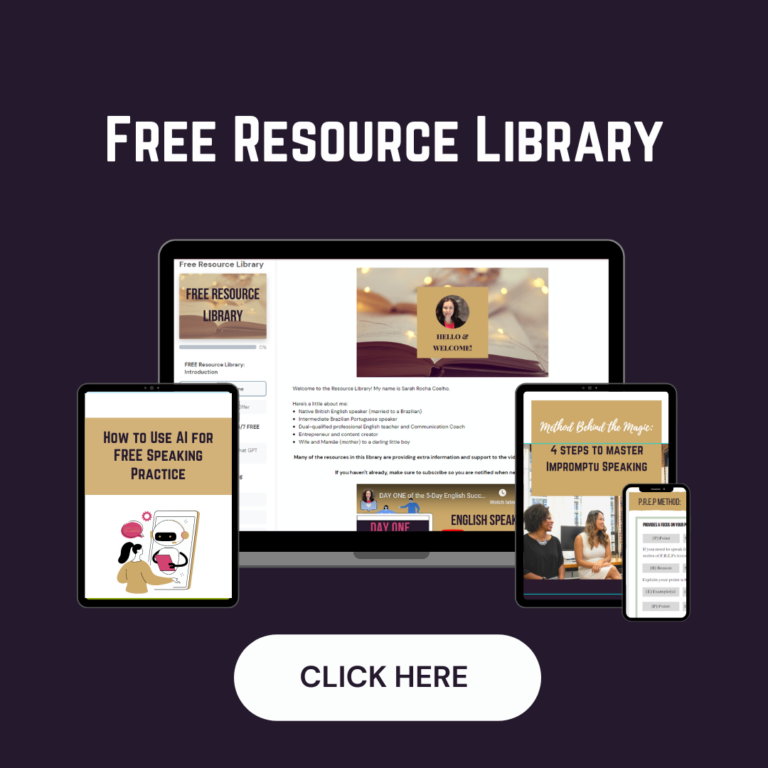Join me as I discuss the dreaded Intermediate plateau. I will describe this strange stage where it feels like you can’t make any progress, what causes it and also some ways that you can overcome it. This podcast is for you if you feel stuck in your English learning journey and you want to know how to move through that!

Listen here:
Podcast transcript:
Welcome to episode six of the Free Your English Podcast!
I’m Sarah, a British native English speaker, an English Teacher with over 23 years of experience and an Intermediate Brazilian Portuguese learner. As someone who has learned another language and understands the struggle of expressing oneself, I’m excited to share today some practical tips to help you continue to make progress in your English speaking skills.
Specifically, in today’s episode, we’re going to talk about what to do when you feel like you’re not making progress.
Firstly, let’s talk about the dreaded “Intermediate plateau.” You might have heard this phrase before. Let’s break it down – i.e. explain it. A plateau refers to a state of little or no change following a period of activity or progress.
An example sentence would be:
Despite increasing her workout intensity and frequency, Jane’s weight loss progress has hit a plateau and she has been struggling to shed (i.e. lose) any additional weight.
Here’s another example:
Although all the diplomats tried hard in the talks, the peace process between the two countries reached a plateau and no agreements were made.
In the context of language learning, a plateau typically refers to a phase where learners are unable to make significant progress in their language skills despite continued efforts and practice. This often happens to English learners once they’ve reached B1 or B2 level. It can be really frustrating but with persistence and the right strategies, it can be overcome, and progress can be made.
Let’s talk about how that can happen. Firstly, it’s important to identify whether you’ve really plateaued or whether you just feel that you have. It’s normal to have ups and downs in your language learning journey, and it’s possible that you’re making progress even if it doesn’t feel like it. This is where recording yourself speaking can be an absolute Godsend (i.e. a very valuable thing) as it provides objective evidence of your progress over time. Literally, if you record yourself speaking regularly, you’ll start to notice all the ways you are improving even though you thought you weren’t.
When I taught English as an Additional Language in Canada in High School, I would often have classes that had refugees who were zero beginners. They had arrived straight from refugee camps into the classroom with absolutely no knowledge of English. Those teenagers were the most inspiring human beings I’ve ever met. They had an intense drive to do well – so much so that the biggest obstacle many of them faced was recognising and celebrating their own progress. One day, about six months into her journey of learning English every day, one of them came to chat with me at lunchtime. She was incredibly sad that her English was so poor and wasn’t improving. She listed off an assortment of reasons: her last essay she’d written had lots of mistakes, she was still getting confused with phrasal verbs, sometimes she still didn’t understand native speakers in shops and on and on.
I asked her to reflect for a moment that she had articulately explained in detail why her English was so poor. Six months ago, she hadn’t known the word “hello.” “Is that not progress?” I asked. She begrudgingly acknowledged it was and laughed. I recommended she start recording herself speak regularly because she was at the stage where it is all too easy to focus on what is lacking rather than what is going well. The fact was she was still improving, she just had stopped noticing it because she wasn’t improving as fast as she would have liked.
So, the first step is to reflect on whether you have really stopped improving or whether you have just not met your expectations for improving. However, it really could be that you’ve hit a plateau. There can be many causes of a plateau, such as a lack of motivation, not practicing enough, using the same study methods, or not challenging yourself enough. Understanding the cause of your plateau is important to figure out what steps to take next.
Let’s talk about how you can break through your plateau. The first thing you should do is get really honest with yourself.
Reflect on whether you are stuck or just feel stuck. Also, reflect on whether it is genuinely important for you to make progress right now. Sometimes, we may feel pressure to constantly improve and reach the next skill level. However, it’s important to recognize that there are times when maintaining our current level is perfectly acceptable and even beneficial. You might be working on another professional skill you want to develop, or you might be going through a period of feeling overwhelmed or stressed. In these phases, focusing on maintaining your current level can be a more realistic and achievable goal. It’s important to remember that language learning is a journey, and there will be times when we are making progress and times when we are simply maintaining our current level. Both are valid and important parts of the process. There are legitimately phases and periods of time in our life where we just want to maintain our level rather than push forward… and that is okay.
However, if you are in a growth phase and you do want to improve, the first practical tip is to mix up your study methods. If you’ve been using the same study methods for a while, it’s possible that they’re no longer challenging you or helping you progress. What I always tell my clients is that often when you reach a high Intermediate level all the things that helped before now do the opposite and hinder you. For most people they need to shift away from focusing on grammar and into more active production of English. They need to practice speaking in different ways and they need to challenge themselves to speak more. For example, you might make a point of practicing impromptu speaking or connecting with native speakers who have shared hobbies.
Another tip is to set achievable goals for yourself and track your progress.
This can help you to stay motivated. Set specific and measurable goals such as making sure you speak with a high-level speaking partner once a week or making sure that you record yourself speaking daily. It’s also really important to celebrate your achievements when you reach your goals, no matter how small they may seem. It’s good to review at least once a month and to reward yourself when you’ve done well.
When you’re feeling stuck, it’s easy to fall into a negative mindset and become demotivated. However, it’s important to stay positive. One way to do this is to remind yourself of the benefits of learning English, such as better job opportunities, the ability to travel with more confidence, and the ability to connect with people from all over the world. It’s also important to overcome any mental blocks that may be holding you back. For example, if you’re afraid of making mistakes, remind yourself that making mistakes is a natural part of the learning process and that you can learn from them. Hitting a plateau is a common experience in language learning, but it’s important to remember that progress is possible.
By mixing up your study methods, setting achievable goals, and overcoming mental blocks, you can break through your plateau and continue to make progress in your English speaking skills.
If you would like to connect with other high-level learners who are committed to moving forward, I invite you to check out my membership: The English Speaking Society. The link is in the show notes.
Thank you for listening to the Free Your English podcast. If you enjoyed this episode, please subscribe and leave a review. I’d also love it if you’d say “hi” on Instagram or Facebook and let me if you’ve ever hit a plateau with your English.
Keep pushing forward (if it’s right for you) and keep practicing your English speaking skills.
See you next time!
Your next steps:
Make sure to access my FREE Resource Library to take action towards gaining the confidence and clarity in English that you desire.
It includes: instructions on how to use AI for free speaking practice, worksheets, interactive quizzes and more!
Click the image below:

